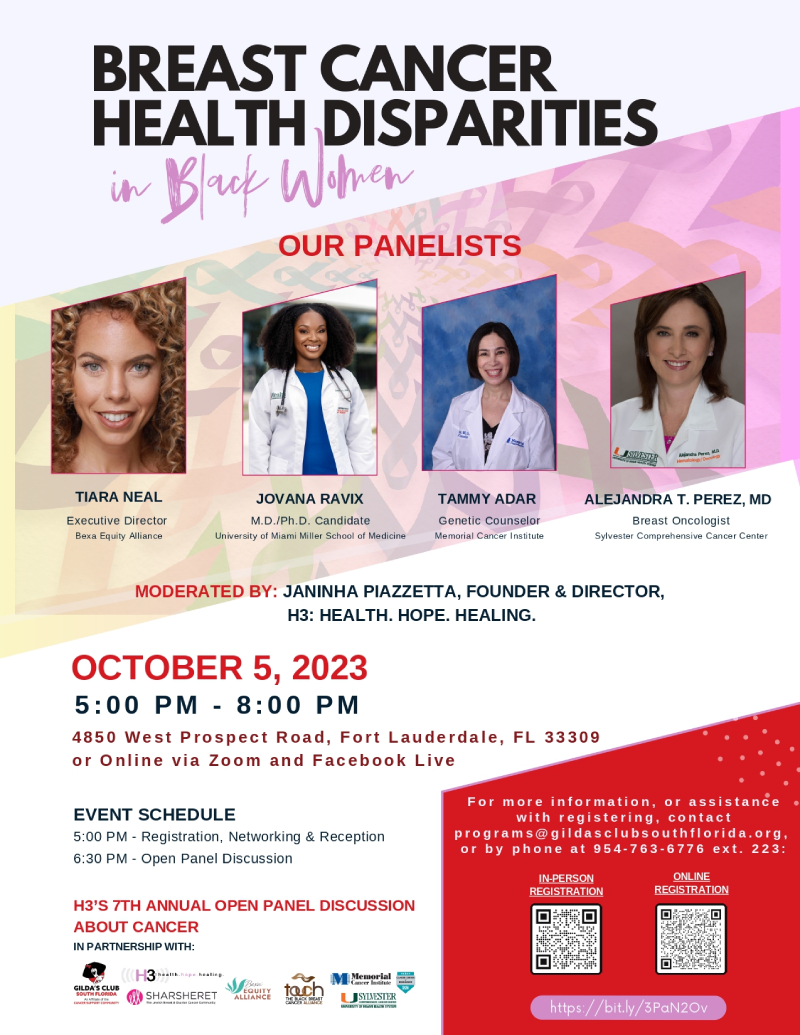
H3’s 7th Annual Open Panel Discussion about Cancer
Topic: “Disparities Black Women Face in Breast Cancer Diagnosis and Treatment.”
Our first three discussions covered topics including the increase in cancer diagnoses, raising awareness, and providing education on prevention, accessing conventional and alternative treatments, challenges related to interacting with the medical system, and the future of cancer care. As mentioned during the second panel, “It begins with me.”
Our 4th and 5th discussions covered the impact of COVID-19 on cancer diagnosis and accessing treatment and how COVID invaded every aspect of our lives – social, political, financial, and possibly most importantly, our overall health, resulting in other health-related issues for cancer survivors such as diabetes, obesity, and mental illness?.
In 2022, The H3’s 6th Annual Open Panel Discussion about Cancer event focused on genetic testing, exploring its value as a tool in diagnosing, treating, and possibly preventing breast cancer, and focusing on genetic markers for specific racial and ethnic groups.
As a follow-up topic, we discussed whether patients who are BRCA1 or BRCA2 positive and estrogen receptor-positive need to have their treatment protocols adjusted and updated, especially after the five-year mark.
Now, as we see a huge disparity in breast cancer diagnosis in black women, our 7th open panel discussion event will focus on “Disparities Black Women Face in Breast Cancer Diagnosis and Treatment.”
For our 7th Open Panel Discussion, we will focus on the following questions in depth:
A culturally competent healthcare system is one that acknowledges the importance of culture, incorporates the assessment of cross-cultural relations, recognizes the potential impact of cultural differences, expands cultural knowledge, and adapts services to meet culturally unique needs.
- How can healthcare providers overcome cross-cultural communication barriers with patients?
- What is the best way to get culturally and medically competent care to historically underserved communities? Why is cultural competence so important in health care, and how can it become a standard of care? What is the best way to get culturally and medically competent care to historically underserved communities?
- What is the most effective way to increase awareness and access to care? How can we empower Black women to be more proactive about their own health? What are some of the ongoing barriers and gaps in the healthcare system for this population?
- How do we address the need for research and clinical trial participation in Black Communities, considering the past history of research abuse and failure to conduct demographically representative trials?
.
H3’s Founder and Director, Janinha Piazzetta, is moderating the discussion panel. Each participant will address the question above from their unique perspective. The audience will have an opportunity to participate with questions towards the end.
Our Panelists:
Alejandra T. Perez, MD: Breast Oncologist at Sylvester Comprehensive Cancer Center in Miami, Associate Professor of Medicine, Miller School of Medicine & University of Miami Medical Director of the Braman Family Breast Cancer Institute in Plantation. Dr. Perez is an Associate Professor of Medicine and triple board-certified in Internal Medicine, Hematology and Oncology. She practices an evidenced based approach to treatment and participates in clinical trials that may deliver access to emerging technologies and treatments that may be more efficacious than those currently available. She has been primary investigator on numerous clinical trials that address the prevention and treatment of breast cancer.
Tiara Neal, Breast Cancer Survivor: She is the Executive Director of the Bexa Equity Alliance and the former SVP of Equity Operations for Bexa. In her current role with the BEA, Bexa’s nonprofit arm, she extends her shared commitment to leave no woman behind by providing Bexa’s highly accurate, convenient, and pain- and radiation-free breast exams at no cost to women most at-risk – women of color and women in underserved communities. Tiara’s experience with a personal diagnosis of breast cancer at a young age has focused her voice and resources upon driving a major change in the adoption of breast cancer early detection, especially in underserved populations and communities of color.
Tammy Adar, Genetic Counselor: Dr. Adar obtained her undergraduate degree from the University of Delaware in Biology with a concentration in Biotechnology, then went on to the University of North Carolina at Greensboro for her Master’s Degree in Genetic Counseling. She then moved to South Florida to practice genetic counseling where she has been doing so for 15 years. Tammy has been working with Memorial Cancer Institute for the past 3 years as the manager of the genetic counselor program providing cancer genetic counseling to individuals with a concerning personal or family history of cancer.
Jovanka Ravix is an M.D. and Ph.D. student at the University of Miami Miller School of Medicine. Her research interests encompass disparities in cancer and the study of molecular drivers that contribute to the varying outcomes observed among different populations, with the goal of promoting greater equity in research. Her ultimate career aspiration as a physician-scientist is to establish a pioneering research laboratory and medical practice dedicated to the prevention and treatment of cancers in diverse populations, achieved through active engagement with communities. She was born and raised in Miami, FL, after her family immigrated to the US from Haiti.
For the event registration and address, contact programs@gildasclubsouthflorida.org and/or call 954.7636776. Ext 223
For more detail about the event, email info@h3hope.org or call 786-374-9009. For H3’s work, visit https://h3hope.org/.

